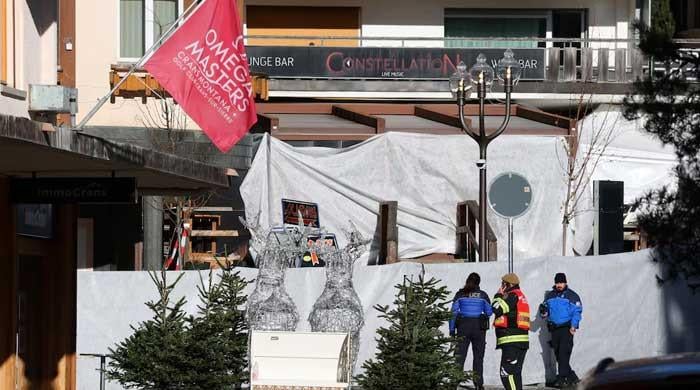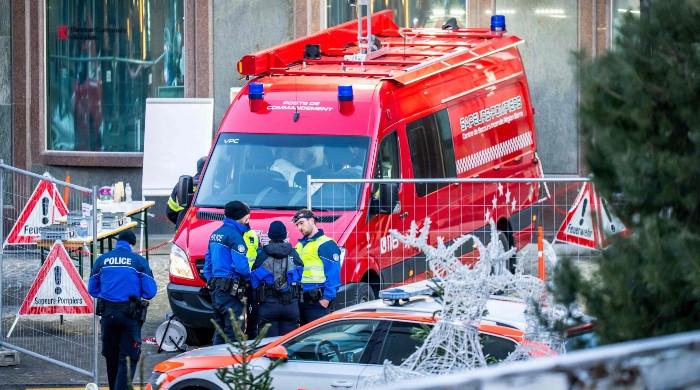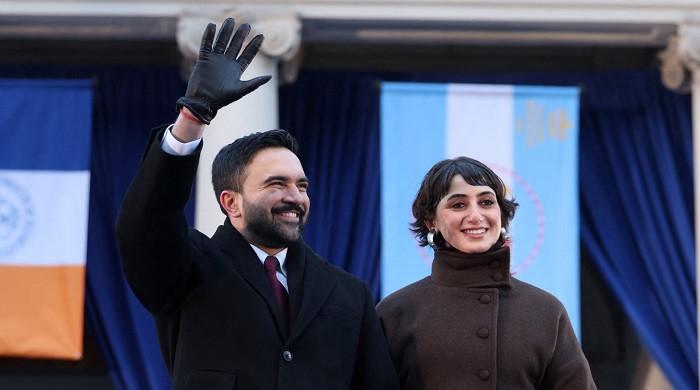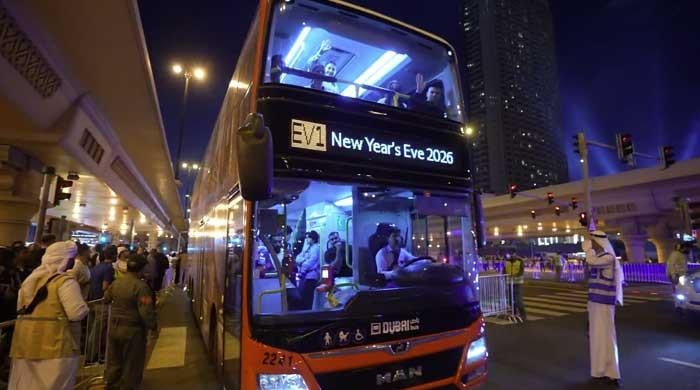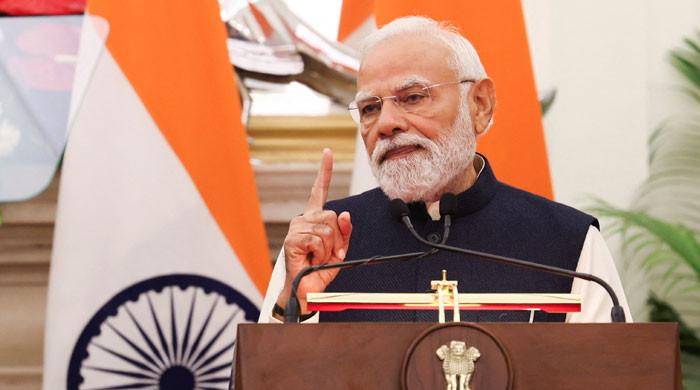Thousands protest in London against India crackdown on Sikhs in Punjab
“We are writing today to commissioner, mayor of London and home secretary," principal adviser to Sikh Federation says
March 23, 2023
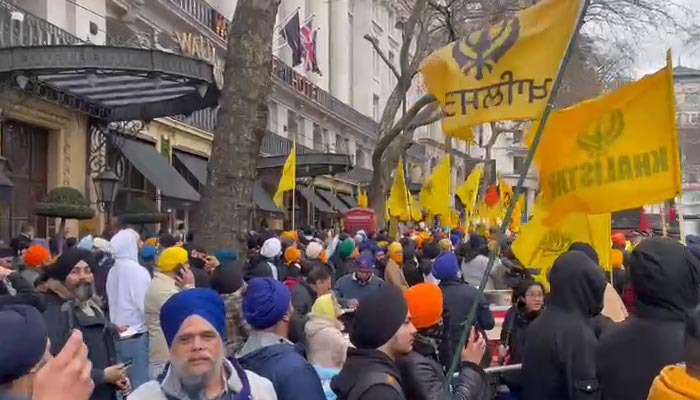
LONDON: Thousands of British Sikhs demonstrated outside Indian High Commission against the Indian government crackdown in Indian Punjab for the arrest of Khalistani Amritpal Singh and the illegal detention of thousands of pro-Khalistan Sikhs across Punjab in fake cases — following a huge turnout of Sikhs for Khalistan Referendum in two cities of Australia over the last two months.
A ruckus was created outside the Indian High Commission diplomatic staff of the commission threw water bottles at pro-Khalistan — a Sikh separationist movement — Sikh protesters from the rooftop of the building.
In order to call out the brutality of the Indian police against Sikhs in Indian Punjab, the protest was organised by the Federation of Sikh Organisations and Sikh Youth Organisations, bringing out thousands of Sikhs on a working day from across the UK.
For the protest, supporters of Khalistan arrived in London from other cities of the country in coaches organised by the local Gurdwaras and Sikh groups. For three hours the protesters chanted slogans in favour of Khalistan and demanded intervention by the UK and western governments against the crackdown in Indian Punjab against Khalistan supporting Sikhs.
As the area around the high commission echoed with slogans of Khalistan, hundreds of police officers were on duty to protect the diplomatic staff who were confined in the building.
The police on duty called for more personnel to keep the enraged protesters under control as they tried to break through the police barricades. The situation became almost out of control as a pro-Modi protester came outside the Indian High Commission carrying a banner of Narendra Modi, the Indian prime minister.
Last week, the Indian flag was taken down from the High Commission building, leading to an arrest by Scotland Yard.
According to media reports, three days after the incident, the Indian government removed the security barriers outside the UK high commission in Delhi and the residence of the British high commissioner in retaliation. In response, security at the Indian High Commission in London was redoubled. A police helicopter flew over the Indian High Commission as more than 200 Police staff on foot and horseback provided security on the ground.
During the protests today, Sikh leaders addressed the protesters and said: “We are only asking India for the basic right of freedom.”
They said that India cannot suppress the Khalistan movement by force, adding, "Through the referendum, we want to tell the world that we want independence from India.”
The diplomatic staff inside the building then hung a huge tri-coloured Indian flag on top of the building.
As more police officers arrived at the site of the protest, a police helicopter was also sent to protect the high commission.
Meanwhile, the enraged Sikh youth threw shoes on pictures of Indian Prime Minister Narendra Modi.
Dabinderjit Singh, the Principal Adviser to the Sikh Federation (UK) said: “The Indian authorities do not know how to respond to these largely peaceful protests by Sikhs.
For the London protest outside the Indian High Commission, they resorted to provocation and throwing ink, eggs and water bottles at those protesting. It has now emerged that counter-protesters and staff were on the roof.”
“We are writing today to the Commissioner, Mayor of London and Home Secretary demanding action against those partaking in violent and provocative actions against the Sikhs peacefully protesting," he added.
It’s understood that the underlying reasons for the Indian govt to launch a crackdown on Sikhs lie in Sikh activism in Western countries which has been on display over the last year as tens of thousands of Sikhs 0- from Britain to Europe to Canada and now Australia have come out to cast their votes in support of Khalistan through Khalistan Referendum voting.
These developments came not long after over 11,000 Sikhs voted for the Khalistan Referendum’s second phase on March 19 in Brisbane, Australia, organised by Sikhs For Justice (SFJ), and the participation of over 50,000 Sikhs in the Khalistan Referendum in Melbourne four months ago.
Australian Sikhs responded robustly to the Indian prime minister’s efforts to stop Khalistan Referendum voting in Australia at the Brisbane Convention and Exhibition Centre amid a massive wave of Indian cyber security mercenary attacks on the electronic voting machines.
The SFJ, the pro-Khalistan secessionist group — which organised the referendum voting — said it suspected that the Indian state-backed hackers were involved in the planned attack.
On March 19, the “Battlefield — Brisbane” Khalistan Referendum Voting Centre was dedicated to Shaheed Bhai Harmeet Singh Bhaowal and Shaheed Bibi Baljinder Kaur who were bombed to death along with their nine-month-old son, Pavittar Singh, on December 5, 1992, by the Indian police forces in Haryana.
The SFJ has said that more than 300 Khalistan Referendum supporters have been detained under sedition laws in India and there were over 1000 raids on supporters of Sikhs For Justice in the week prior to the Indian government’s crackdown on Amritpal and his supporters.




